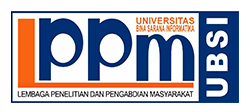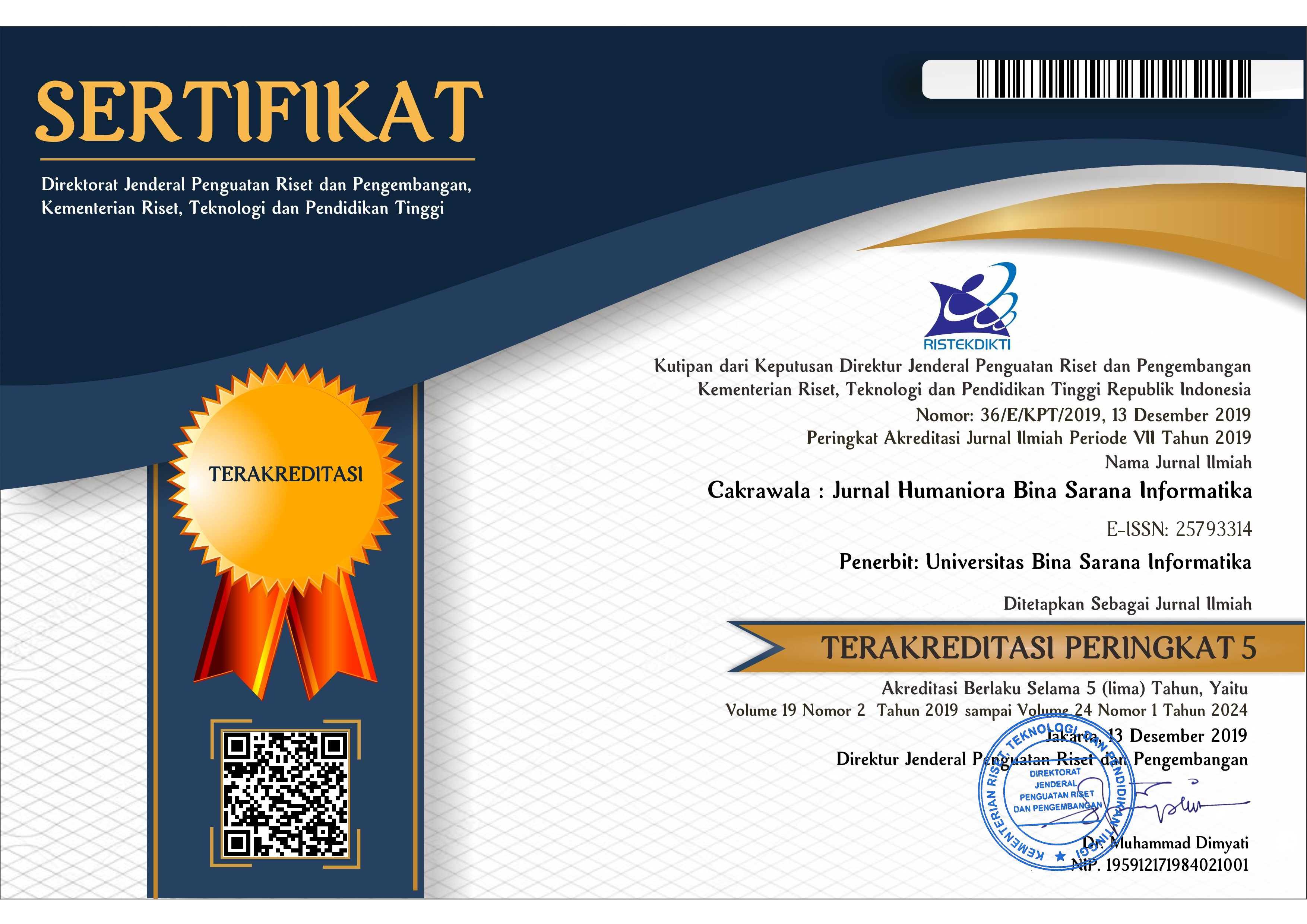KOMODIFIKASI RAMADAN & COVID-19 DALAM IKLAN TELKOMSEL EDISI “TERUS JALANKAN KEBAIKAN”
Abstract
Nowadays, advertising is not merely having urgency as a means of promotion of commodities, but it has become the commodity itself that is worth selling to get a lot of financial profit. The concentration of advertisers turns into a commodity that sells (commodification). Advertising is a strategic pillar to be utilized by producers, including for producers of telecommunications service providers, Telkomsel. This research aims to uncover the significance of the commodification of Ramadan & Covid-19 in "Terus Jalankan Kebaikan" edition of Telkomsel ads. In this research used a critical paradigm, qualitative approach, and the Semiotics method of Charles Sander Pierce. The object of this research is the "Terus Jalankan Kebaikan" edition of Telkomsel ads in one minute duration. The results showed Telkomsel's advertisement "Terus Jalankan Kebaikan" has carried out the commodification of Muslim activities during Ramadan and the condition of Covid-19. This is demonstrated by the visualization of sending gifts, maintaining the relationship with the video call quota, beneficial to learn to read Al-Qur’an, access a seven-minute lecture video as part of running Ngabuburit Ramadan with the quota of streaming, online shopping in Telkomsel to share to the people in need, and do donation activities using the donation Tukar POIN feature. Meanwhile, we saw in Telkomsel advertisement that with a stable and strong Internet network, the need to gather with family can run smoothly and can run common good activities. The human goodness and need activities for social interaction are important points that are packaged in the advertisement.
References
Albintani, M., et al. (2014). Masa Depan Komunikasi, Masa Depan Indonesia: Demokratisasi Masyarakat Plural. Cet.1. Jakarta: Ikatan Sarjana Komunikasi Indonesia (ISKI).
Andy, S. (2018). Hakikat Puasa Ramadhan dalam Perspektif Tasawuf ( Tafsir Q . S Al-Baqarah : 183 ). Jurnal Ibn Abbas, 1(1), 1–17.
Baran, S. J., & Davis, D. K. (2010). Teori Komunikasi Massa: Dasar, Pergolakan, dan Masa Depan. Jakarta: Salemba Humanika.
Dewi, M. (2013). REPRESENTASI PAKAIAN MUSLIMAH DALAM IKLAN (Analisis Semiotika Charles Sanders Peirce pada Iklan Kosmetik Wardah di Tabloid Nova). Profetik, 6(2), 63–82.
Fiske, J. (2012). Introduction to Cummunicaton Studies. Diterjemahkan oleh Dwiningtyas, Hapsari, 2012. Pengantar Ilmu Komunikasi. Jakarta: Rajawali Pers.
Hidayat, A. (2016). Budaya Konsumen Bulan Ramadhan Bagi Masyarakat Modern Di Indonesia. IBDA: Jurnal Kajian Islam Dan Budaya, 14(2), 267–278. https://doi.org/10.24090/ibda.v14i2.2016pp.265-276
Hetilaniar. (2019). Analisis Simbol Wacana Iklan Detergen Pada Siaran Televisi RCTI: Kajian Semiotika. Jurnal Kredo, Vol. 2 No. 2 April 2019.
Khatimah, H. (2018). POSISI DAN PERAN MEDIA DALAM KEHIDUPAN MASYARAKAT. TASÂMUH, 16(1), 119-138. https://doi.org/10.20414/tasamuh.v16i1.548
Labas, Y. N., & Yasmine, D. I. (2017). Komodifikasi di Era Masyarakat Jejaring: Studi Kasus YouTube Indonesia. Jurnal Pemikiran Sosiologi, 4(2), 104. https://doi.org/10.22146/jps.v4i2.28584
Lavinda. (2020, May 12). Melihat Prospek Bisnis saat Krisis di Tengah Ramadan dan Lebaran. Accessed from: https://www.jurnal.id/id/blog/melihat-prospek-bisnis-saat-krisis-di-tengah-ramadan-dan-lebaran/
Mosco, V. (2009). The Political Economy of Communication; Second Edition. London: SAGE Publications.
Mudjiyanto, B., & Nur, E. (2013). Semiotika Dalam Metode Penelitian Komunikasi: Semiotics In Research Method of Communication. Jurnal Penelitian Komunikasi, Informatika dan Media Massa – PEKOMMAS, Volume 16 No. 1 – April 2013.
Moriarty, S., et al. (2015). Advertising & IMC Principles & Practice Ninth Edition. London: Pearson Education Limited.
Nielsen. (2019, April 30). BELANJA IKLAN TUMBUH 4 PERSEN DI KUARTAL AWAL 2019. Accessed from: https://www.nielsen.com/id/en/press-releases/2019/belanja-iklan-tumbuh-4-persen-di-kuartal-awal-2019/
Nugroho, Y., Siregar, MF., Laksmi, S. (2012). Memetakan Kebijakan Media di Indonesia (Edisi Bahasa Indonesia). Laporan. Bermedia, Memberdayakan Masyarakat: Memahami kebijakan dan tatakelola media di Indonesia melalui kacamata hak warga negara. Kerjasama riset antara Centre for Innovation Policy and Governance dan HIVOS Kantor Regional Asia Tenggara, didanai oleh Ford Foundation. Jakarta: CIPG dan HIVOS.
Piliang, Y. A. (2010). Hipersemiotika: Tafsir Cultural Studies atas Matinya Makna. Yogyakarta: Jalasutra.
Radford, G. P. (2005). On the Philosophy of Communication. USA: Wadsworth.
Riani, N. (2017). Model Perilaku Pencarian Informasi Guna Memenuhi Kebutuhan Informasi (Studi Literatur). Jurnal Publis, 1(2), 14–20.
Royanulloh, R., & Komari, K. (2019). Bulan Ramadan dan Kebahagiaan Seorang Muslim. Jurnal Psikologi Islam Dan Budaya, 2(2), 51–62. https://doi.org/10.15575/jpib.v2i2.5587
Supradono, B., & Hanum, A. N. (2011). PERAN SOSIAL MEDIA UNTUK MANAJEMEN HUBUNGAN DENGAN PELANGGAN PADA LAYANAN E-COMMERCE. VALUE ADDED, 7(2), 33–45.
Setiadi, A. (2016). Pemanfaatan Media Sosial untuk Efektifitas Komunikasi. Cakrawala-Jurnal Humaniora, 16(2).
Suryadi, I. (2011). Peran Media Massa dalam Membentuk Realitas Sosial. Academica, 3(2).
Tafsirweb. Quran Surat Al-Baqarah Ayat 183. Accessed from: https://tafsirweb.com/687-quran-surat-al-baqarah-ayat-183.html
Tafsirq. Surat Al-Baqarah Ayat 183. Accessed from: https://tafsirq.com/2-al-baqarah/ayat-183
Ulya, H. (2019). Komodifikasi Pekerja Pada Youtuber Pemula Dan Underrated. Interaksi: Jurnal Ilmu Komunikasi, 8(2), 1–12. https://doi.org/https://doi.org/10.14710/interaksi.8.2.1-12
Youtube (Telkomsel). Terus Jalankan Kebaikan. Accessed from: https://www.youtube.com/watch?v=XrtprRKABAk
DOI: https://doi.org/10.31294/jc.v20i1.8225
ISSN: 2579-3314


Dipublikasikan oleh LPPM Universitas Bina Sarana Informatika
Jl. Kramat Raya No.98, Kwitang, Kec. Senen, Kota Jakarta Pusat, DKI Jakarta 10450

This work is licensed under a Creative Commons Attribution-ShareAlike 4.0 International License









